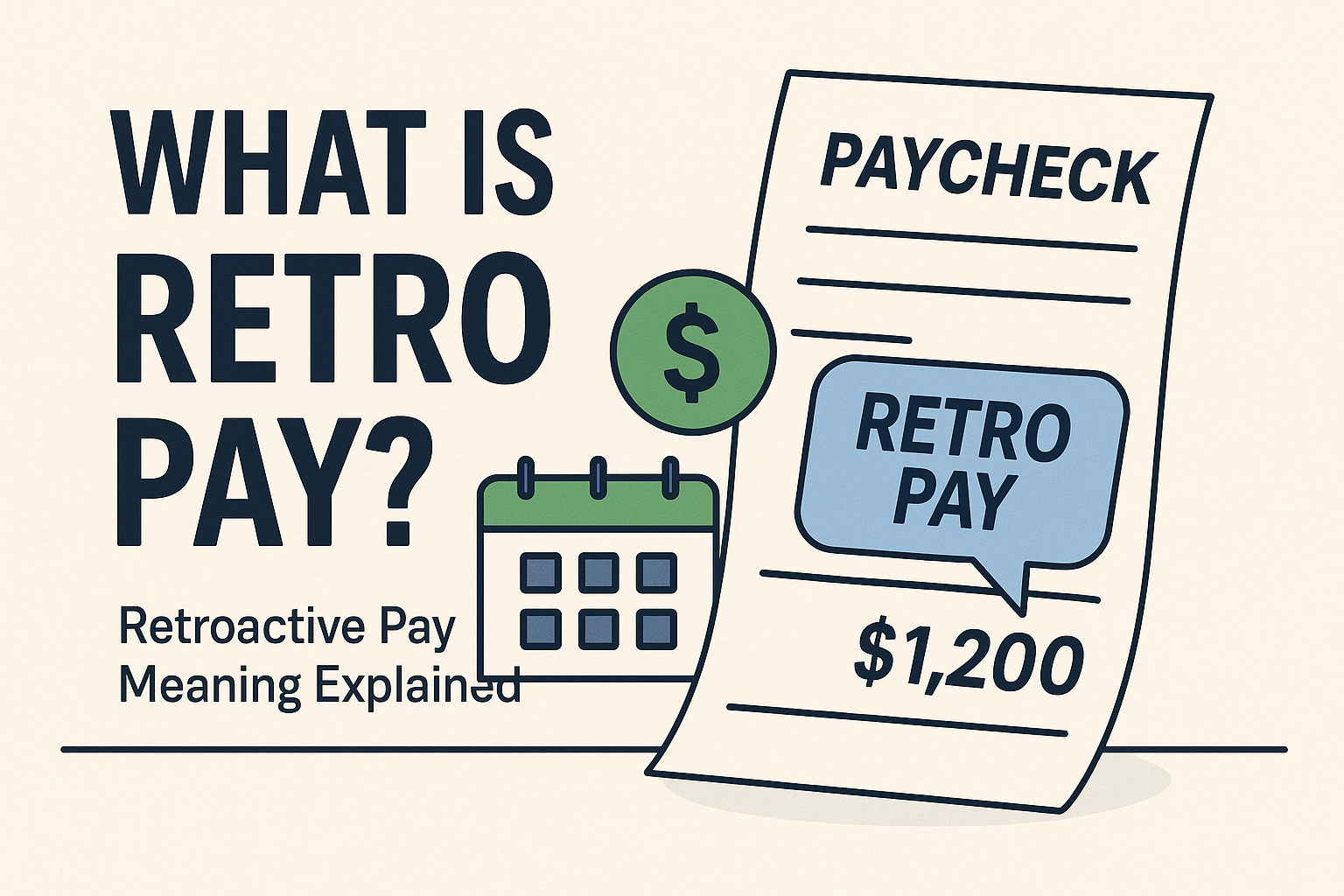Retro pay, or retroactive pay, is a type of compensation due to an employee for the work he or she performed during a former (retro) pay period. Retro pay is given out by employers when they’ve paid what the worker was due and vice versa.
This is an appropriate compensation for past mistake. This could be the result from late raises, unpaid overtime or even miscalculated wages. Retro pay makes sure that employees are given their earned salaries.
Why Retroactive Pay Happens
There are many reasons why retroactive pay can be given.
Retro pay: If salary increase is approved but not processed timely, it is covered by the late Raise.
Retroactive adjustments: As it relates to Retroactive adjustments, they may sometimes be a result of Collective bargaining agreements or contract changes.
Human error in the payroll system will lead to incorrect payments and that will need to be fixed.
New Role or Title: Even if an employee receives a new post and receives a new pay, the new pay may not come to effect immediately.
Again, all these outcomes result in a post payment adjustment.
How Retro Pay Works
The retroactive pay is normally calculated by finding the difference between the rate here which was new and the old rate, and then multiplying the hours worked in the affected period.
Say you got a meager $1 raise two months ago, and you were paid at your old rate – then all the time since the raise date that you worked, you’d be paid the difference.
In most cases, this payment is made by your employer and is included in your next check, or paid out in a separate check.
Retro Pay vs Back Pay
While the terms are sometimes mistaken for one another, they are actually distinct:
Retro Pay: Adjusts wage differences due to changes like raises or promotions.
Wages behind payments: This is unpaid wages for work done due to legal difficulties or violations.
Retro pay is proactive and is being done inside the company while back pay are using legal claims or settlements to claim back their pay.
Is Retro Pay Taxable?
However, retroactive pay definitely counts as taxable income. It is considered as regular income and subject to same deductions. This includes:
Federal and state taxes
Social Security
Medicare
Other withholdings (like retirement contributions)
Be aware the lump sum payment will be a slightly higher tax.
How to Ensure Accurate Retro Pay
Mistakes can be costly. To ensure correct retroactive pay:
Form Contracts: For work hours or wage agreements, or whatever changes take place.
Compare what was paid with your current rate to review Pay Stubs.
With errors spotted, speak to your payroll department.
Familiarise yourself with company policies and labor laws.
This will help in avoiding confusion as well as giving fair compensation.
When Exactly Will You Receive Retro Pay?
When the error is processed and you find retroactive pay should be in your paycheck. This would occur within one or two cycles depending on their payroll schedule.
If you haven’t received retro pay granted, while some companies will delay the processing, you can follow up and get your money when you should have it.
Common Industries with Retro Pay Issues
Retro pay can be present in any job though it is most common in:
Government positions
Education systems
Unionized labor
Healthcare roles
Public service jobs
Delayed adjustments are usually due to the complexity of contracts and pay structures in these sectors.
Final Thoughts on Retro Pay
Retro pay ensures the fairness and accuracy of compensation stated in the covered time involved. As it is, you have the right to be paid accurately, no matter what the reason is for this inaccurate payroll. Keep updated, and keep track of your earnings, always standing up for all that you worked towards.


The concept of retroactive pay, or Retro Pay in short - as a means to compensate for previously unpaid wages owed due to an error or change made after the fact – offers indispensable clarity and understanding.
Retro Pay: A Comprehensive Explanation of Its Definition and Significance in Retroactive Compensation.
The term retro pay or retroactive compensation refers to the practice of providing a current employee with back payments for benefits, overtime work previously uncompensated due periods added onto their regular salary as per policy changes in advance.
A comprehensive explanation of retro pay: How it works, its significance to employees' compensation packages and when a company might choose this formative payment strategy.
Retro Pay in its essence signifies the retroactive payment of benefits or salaries to an employee, often due compensation for past services rendered that were not initially compensated accordingly. It essentially rectifies prior mistakes by reimbursing missing paychecks retrospectively.
Retro Pay: A Guide to Understanding the Concept of Retroactive Compensation in today's Workplace Dynamics.
Retro Pay: A Comprehensive Definition and Exploration of the Concept.
Retro Pay: A Comprehensive Explanation of Its Meaning and Application in Retroactive Compensation.
In the workplace context, retro pay refers to compensation granted retrospectively for past due wages or benefits. It's a provision that compensates employees who were incorrectly underpaid in their initial payments and ensures they receive what was rightfully owed.
Retro Pay: A tale of justice and pow'r to correct past injustices, retroactive pay holds the promise for employees facing unintended salary discrepancies.














